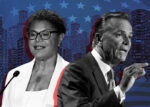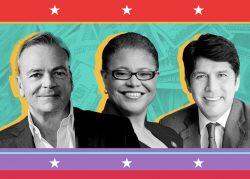Faced with tough questioning about his plan to put his business in a blind trust, mayoral candidate Rick Caruso stuck to his guns during a debate on Thursday.
“I want no involvement in my company,” Caruso emphasized when a moderator asked for an explanation of the developer’s blind trust plan. “One hundred percent of my time and energy is going to be the mayor of Los Angeles — period. End of story.”
Caruso first declared his blind trust plan early this year, soon after announcing his surprise mayoral candidacy. Along with establishing the trust, he promised that while in office his company would not pursue new projects in the City of L.A., and he also announced a succession plan, promising to hand over the chief executive reins to Corinne Verdery, the company’s chief development officer, once he took office.
But would the trustee even have the ability to buy and sell Caruso holdings, the debate moderator pressed? “If they wanted to sell The Grove, could they do it?”
“I just said yes!” Caruso cut in. “They’re going to do it!”
In August, ahead of the race’s final fall stretch — and after revised data from the primary showed Caruso facing an uphill battle with voters — he changed his plans, announcing that he would step down as CEO in September instead of waiting until after the election.
Caruso has repeatedly emphasized that his blind trust plan is in line with legal requirements — during the debate he stressed that it was “the exact same blind trust that Governor Newsom did with his holdings” — but considering the size and influence of Caruso, a company with high-profile retail properties and development projects throughout Greater L.A., some ethics experts say a blind trust plan — which may remove Caruso from operational decisions but would not actually liquidate assets — doesn’t go far enough to prevent conflicts of interest for a mayor who would have large influence over land use decisions.
“He cannot forget that he’s a developer,” Carmen Balber, executive director of the group Consumer Watchdog, told the L.A. Times earlier this year, “and he does better when rules favor developers.”
Verdery, a trusted Caruso deputy, is also likely to hew closely to the founder’s corporate vision.
Thursday night’s debate between Caruso and Congresswoman Karen Bass was hosted by the radio station KNX News and held inside the station’s studio on Wilshire Boulevard.
In contrast to the first debate between the two last month, in which real estate issues dominated much of the night https://therealdeal.com/la/2022/09/22/real-estate-takes-center-stage-at-la-mayoral-debate/, on Thursday the topics ranged more broadly, veering from the two candidates’ dueling USC corruption allegations to Caruso’s Scientology attack ads to police officer recruitment to L.A.’s upcoming Olympics.
But the debate again focused heavily on homelessness and affordable housing. In one exchange, a moderator took aim at Caruso’s residential development record, pointing out that the cheapest unit in his only residential building costs more than $6,000 per month. At another point, the developer stressed the inefficiency of government homeless housing construction, which is costing as much as $800,000 per unit, according to a widely circulated audit published early this year.
“That’s taxpayer money,” Caruso said. “There’s private companies — we can build them for $60,000 a unit … and that’s what I’ll do.”
Bass, for her part, agreed that building regulations should be relaxed and also stressed a more holistic approach to preventing homelessness, as well as federal partnerships.
“This problem has exploded to the point of being an emergency,” she said, referencing homelessness. “And I would, on day one, declare a state of emergency, but I will tell you that’s not good enough. There needs to be a federal state of emergency and this needs to be responded to just like we’re responding to a hurricane.”
With a month before the election, recent polls have shown a tightening race, although Bass remains the frontrunner.
Read more


